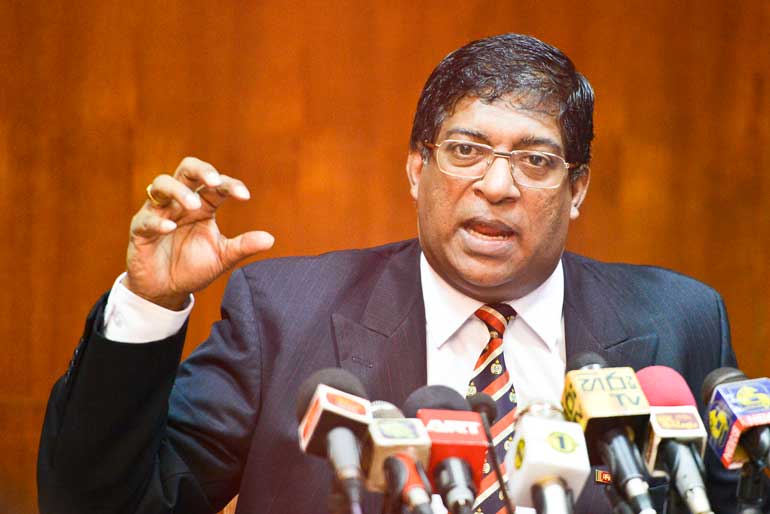Friday Feb 27, 2026
Friday Feb 27, 2026
Monday, 3 August 2015 00:00 - - {{hitsCtrl.values.hits}}
 Minister of Finance Ravi Karunanayake
Minister of Finance Ravi Karunanayake
In pursuit of the good governance concept introduced by the new Government by alleviating the corruption and fraud that prevailed during the last ten years of the Mahinda Rajapaksa Government, the total Government revenue during the first quarter of 2015 has increased by 16.4% to Rs. 285.6 billion.
The Minister of Finance Ravi Karunanayake, elaborating on the economic performance of the new Government, said that because of the reforms and good management practices brought into the public sector, government revenue had increased to Rs. 285.6 billion in the first quarter of 2015 from Rs. 245.2 billion recorded during the corresponding period in 2014.
This is a reflection of an increase in both tax revenue by Rs. 30 billion and non-tax revenue by Rs. 10.5 billion, largely due to action taken to arrest tax evasion and the illegal import of goods by influential people enjoying the patronage of politicians from the former regime.
Corruption was rampant due to nepotism and cronyism in all sectors of the economy and it was a common occurrence in the past to import ethanol into the country in large quantities in an illegal manner, depriving the country of its tax revenue. Since the new Government has completely blocked the illegal import of ethanol, the tax revenue siphoned off by the cronies of the past rulers is now added to the state coffers.
“As a result, excise revenue alone has increased by Rs. 6,000 million per month”, Minister Karunanayake said in a statement.
Former President Mahinda Rajapaksa and his associates ruined the economy of the country by plundering the public wealth. Since they have now become politically bankrupt, in this period of elections they are issuing malicious statements to deceive the masses saying that development is at a standstill, the Minister said. However, the Minister emphatically stated that the people who rejected the corrupt rule of Rajapaksa at the 8 January presidential election would not be deceived once again on 17 August.
Karunanayake emphasised that the new Government under UPFA leader Maithripala Sirisena and Prime Minister Ranil Wickremesinghe had neither halted nor terminated any development projects in the country. The Treasury has already released Rs. 11,900 million rupees to continue the ongoing projects at district level. Rs. 9000 million was paid for the projects that were completed, he revealed.
The previous Government’s excessive public expenditure and the expansion of infrastructure facilities with foreign loans under higher interest rates shot up the growth rate but there was no economic development to pay any dividend to the masses, he said. Therefore, the new Government, in order to liberate the people, including public servants, from this misconception of the quantitative growth brought qualitative change in their lifestyle by increasing the public sector salary by Rs. 10,000 and bringing down the prices of essential goods including fuel and gas. These concessions, given by the new Government within its first 100 days, have provided an ordinary family a monthly saving of Rs. 20,000.
The Rajapaksa Government boasted with much fanfare of increasing the agricultural economy. Though Sri Lanka has opportunities for the direct use of the natural resources to stimulate the agro-economy, past records show that the agro sector had a diminishing return to the economy. The contribution of the agriculture sector to the GDP has gradually diminished during the last 10 years.
According to Central Bank report, the total national paddy production has decreased by 26.8% in 2014 to 3.38 million metric tons. Similarly, the total revenue of the Government, which was at 20% in 2005, has gradually come down up to 12.2% last year. Even the contribution by the agricultural sector to the GDP has come down considerably during the last ten years, lending both the agricultural and the manufacturing economy a status of no returns.
Karunanayake said that flawed economic policies by the previous Government, embedded with corruption and fraud, resulted in the continuous deterioration of government revenue and the agro-based economy as well. The Minister concluded that the people who rejected the Rajapaksa Government for its wrongdoings and corrupt practices at the 8 January election would reject it once again on 17 August.